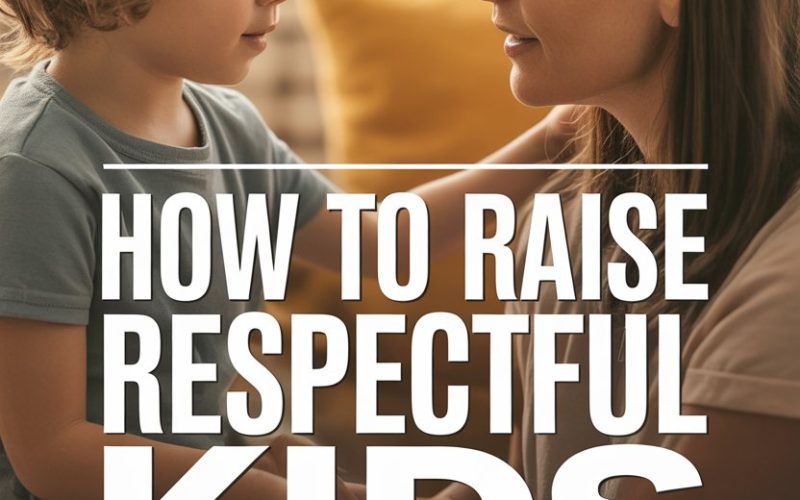Modern parents are juggling so many flaming swords (and occasionally, someone throws in a chainsaw for good measure).
Raising respectful kids—kids who aren’t just polite to Auntie at Christmas, but genuinely consider the feelings and boundaries of others—often feels like one more thing to juggle, preferably without accidentally teaching them that “respect” means “do what I say or the sky will fall.”
Can you raise respectful children without the ever-present threat of doom and gloom? Absolutely.
All it takes is a mix of empathy, clear expectations, a dash of patience, and a massive coffee.
Respect: Not Just a Word on a Classroom Poster
Respect isn’t about fear.
It’s not about raising kids who jump whenever you snap your fingers. It’s about nurturing kids who value others and themselves, who understand that other people’s feelings, boundaries, and perspectives matter.
Traditionally, some parents leaned on fear-based tools—the “because I said so” school of hard knocks. That style usually delivers quick results, but at the cost of trust, communication, and long-term relationship health.
If your goal is lifelong respect (and fewer eye rolls at family gatherings), skip the threats and focus on fostering genuine connection.
Model What You Want to See
Children might not listen to every word you say, but they absolutely notice your actions—especially that moment when you mutter about the driver who cut you off. The fastest way to teach respect is by showing it, everywhere and always.
Speak kindly to your partner, the postie, and even yourself. apologize when you get things wrong. Value your child’s feelings, even when they’re about as rational as a toddler negotiating for a third biscuit.
When they spill apple juice all over the sofa, resist the urge to shout. Instead, say, “Accidents happen. Let’s clean it up together.” Consistency here matters far more than any lecture.
Set Clear, Calm Boundaries and Expectations
Respect can’t grow in chaos. Kids feel secure (and behave better) when they know the rules of the game. Discuss your family’s boundaries without resorting to threats.
Try, “We don’t hit. We use words when we’re upset,” or, “It’s bedtime now. We’ll read one story.” Stay calm, firm, and predictable.
When a rule is broken, follow through on the consequence you’ve already explained, but leave out the scary voice and the ominous “wait till your father/mother gets home.”
Consistency is your secret weapon. Kids test boundaries not because they’re plotting your downfall, but because they’re checking if the world is as reliable as you claim.
Teach Empathy—Yes, Even to That Tiny Tyrant
Empathy is the engine of respect. It’s what helps kids see why we don’t snatch toys or laugh when someone trips. You can nurture empathy by naming feelings, both their own and others’.
When your child yells at their sibling, try, “It looks like you’re angry. But see, your sister is crying now. How do you think she feels?”
Encourage them to imagine someone else’s perspective. Storytime is a goldmine for this—pause and ask, “How do you think the dragon feels?”
By putting themselves in someone else’s shoes (or dragon scales), your child will start building inner motivation to be kind, not just avoid punishment.
Let Natural Consequences Do the Heavy Lifting
Nothing teaches like experience. When it’s safe, let your child feel the natural result of their actions.
If they refuse a coat, maybe they’ll be chilly at the park for a bit. When a toy breaks after being thrown, that toy isn’t magically replaced.
Natural consequences are powerful teachers that don’t require you to become the family dictator.
The key is not adding extra punishment—your role is to empathize (“Oh, I bet you wish the toy wasn’t broken”) and help them process what happened.
According to developmental psychologists, this supports problem-solving skills and builds respect for boundaries—without fear as the main motivator.
Praise Effort and Kindness, Not Just Obedience
It’s easy to gush when your child listens the first time. But what about when they apologize on their own, comfort a friend, or try to resolve an argument without shouting? Highlight these moments.
Use specific praise—“That was really thoughtful, helping your brother with his shoes,” rather than a generic “good job.”
When you notice the moments your child chooses kindness or fairness, you’re reinforcing the values that build genuine respect.
Children who only hear praise for obedience often miss the message that respect is about relationships, not just following orders. Celebrate compassion, effort, and growth.
Use Calm, Constructive Discipline
All children push boundaries. When it’s time to correct behavior, keep your cool. Yelling or threatening only teaches them that power equals respect—or, worse, that love can be withdrawn.
Try a “time-in” approach—sit with your child, talk about what went wrong, and brainstorm together how to fix it. Ask, “What could you do differently next time?”
This teaches kids how to repair relationships after mistakes, and that consequences are about learning, not fear.
Research from the American Academy of Pediatrics supports this approach, showing that children benefit from discipline rooted in guidance and connection, not punishment.
Give Kids Real Choices and Voice
Respect is a two-way street. Kids need to feel their opinions matter, even if you don’t let them eat ice cream for dinner.
Offer real choices when you can—“Would you like to brush your teeth before or after your bath?”—and listen (actually listen) to their concerns.
When they disagree with you, avoid shutting them down. Instead, say, “I hear you wish you could stay up late. Sleep is important, but I’m glad you told me how you feel.”
This practice teaches kids that respect isn’t about silence or agreement; it’s about feeling seen and heard.
Apologize When You Mess Up
Every parent loses their cool or gets something wrong (usually before coffee). When you snap or make a mistake, own it. Apologize honestly: “I was really grumpy when I shouted. I’m sorry. I’ll try to do better.”
This simple act models humility and shows your kids that respect goes both ways—everyone, even grownups, makes mistakes and can make amends.
It’s incredibly powerful for kids to see that love and respect survive even the wobbliest moments.
Keep Communication Open—Even About the Tough Stuff
Respect isn’t just about manners; it’s also about honesty, even when it’s uncomfortable. If your child lies, cheats, or says something hurtful, resist the temptation to launch into the Parental Rant Olympics.
Calmly talk about what happened, why it’s a problem, and how things might go differently next time.
Encourage your child to come to you with problems, worries, or mistakes, promising (and proving) you won’t lose it or dish out a punishment designed for maximum misery.
When kids trust they can talk to you without fear, respect deepens. That’s the foundation of a healthy relationship for years to come.
Respect for All—No Matter the Age or Mood
Even on days when your child resembles a wild animal recently let out of a cage, they deserve respect. Speak kindly. Listen. Avoid sarcasm meant to sting (save it for your group texts).
That doesn’t mean you’re a pushover. It means you hold boundaries with kindness, insist on fairness, and treat your child’s feelings with care—even when you’re tempted to ask if they’re auditioning for a soap opera.
Ditch the Fear—Keep the Respect
Fear might grab short-term results, but it’s respect, empathy, and connection that teach children how to live—and love—well.
Skip the threats, skip the power plays.
Choose calm, consistent leadership, and show your little humans how to treat others (and themselves) with deep, lasting care.
They just might surprise you—possibly right after they spill juice on the sofa again.




